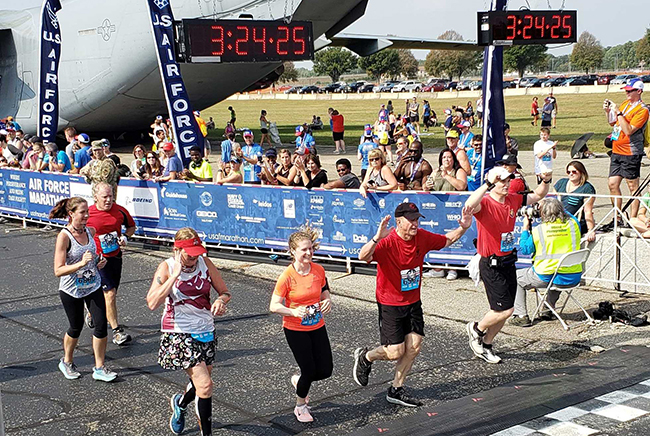
Air Force Chief of Staff Gen. David Goldfein—the fifth runner from the left wearing a black cap in the photo above—crosses the finish line of the 2019 AIr Force Half Marathon on Sept. 21, 2019. Staff photo by Brian Everstine.
WRIGHT-PATTERSON AFB, Ohio—Air Force Chief of Staff Gen. David Goldfein toed the starting line of the 2019 Air Force Marathon here Sept. 21, hoping to spur a greater focus on physical fitness in the service from the top down.
“If you are a command team in the United States Air Force, you need to be fit,” Goldfein told Air Force Magazine. “You need to be on a fitness program, you need to take fitness and wellness and health seriously.”
The Air Force’s top uniformed officer wants commanders to drive a fitness-minded culture change within their organizations and “emphasize fitness as a responsibility of being an airman.”
To set an example, Goldfein trained for about three months to run in the half-marathon event at Wright-Patterson. He stopped to thank airmen and volunteers—and to take plenty of pictures with other runners—before crossing the finish line in the shadow of a C-17.
“I should never ask any airman to do something that I’m not willing to do,” Goldfein said en route to the race.
Alongside Chief Master Sergeant of the Air Force Kaleth Wright, Goldfein wants to move away from the service’s singular focus on passing or failing physical fitness tests. Instead, leaders say fitness should be an airman’s way of life. That’s as good for the service as it is for the body, they argue.
“I don’t know when I’m going to ask you to deploy to a place where it’s 120 degrees on a ramp, or 30 below on the flightline,” he said. “I just know that when you arrive, it’s not the time to start a fitness program. Let’s get it going right now, to really instill this as a command team responsibility.”
Eventually, Goldfein said he wants airmen to go into required PT tests with an attitude of, “Bring it. I’ll take your test,” instead of apprehension or frustration.
Goldfein discussed the new effort at his annual meeting with wing commanders shortly before race day. Commanders are open to the idea so far, he said, but “the proof will be in the execution.”
While leadership hopes this public push will yield broad results among commanders and their units, the message isn’t backed up by additional testing or regulations.
“I’m not going to go out, not going to measure, not going to do surveys,” Goldfein said. “Not going to change anything out there in the force, other than the dialogue between me and command teams, setting expectations as chief. The message is pretty clear: we do the nation’s business, and it’s tough.”
The initiative comes as the Pentagon’s August edition of the “Medical Surveillance Monthly Report” found that 18.1 percent of the Active-Duty Air Force was obese in 2018, slightly higher than the Defense Department’s average, and as the Air Force mulls changes to its PT regimen.
For his half-marathon, Goldfein followed an incremental walk-run training plan from famed running coach Jeff Galloway. At first, the miles were a slog.
“It was a struggle to get through three, then four, then five,” Goldfein said. “Eventually you start putting miles on.”
Goldfein, who in 2001 finished the Marine Corps Marathon, this year logged miles around his home in the mornings and trained on treadmills while away or at the gym. He said a mental breakthrough came while running along the Thames River in London, during a trip to the Royal International Air Tattoo.
“I wasn’t thinking about the run—I was enjoying being out,” Goldfein said.
On race day, Goldfein decided against a regular PT uniform and instead donned a shirt from the 2019 Special Tactics Memorial March in remembrance of SSgt. Dylan Elchin, a combat controller who was killed in action in Afghanistan in 2018. He also wore a bracelet etched with Elchin’s name and a hat given to him at a survival, evasion, resistance, and escape class graduation at Fairchild AFB, Wash.
After crossing the finish line, Goldfein turned around to award medals to the full and half-marathon finishers behind him—not all of whom recognized who he was.
“It was a good race,” he said on the way home. “I’ll probably sleep pretty well tonight.”